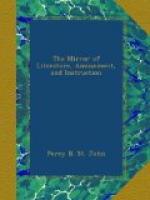There was a pause. Four lamps, lighted before the shrine of St. George, cast a dim radiance on his armour and steed, represented as he was in the act of transfixing with his lance the prostrate dragon, whose outstretched wings and writhing neck were in part touched by their beams. The rest of the chapel was dimly illuminated by the autumnal sun, which could scarce find its way through the stained panes of the small lanceolated window, which was its only aperture to the open air. The light fell doubtful and gloomy, tinged with the various hues through which it passed, upon the stately, yet somewhat broken and dejected form of the female, and on those of the melancholy and anxious father, and his son, who, with all the eager interest of youth, suspected and anticipated extraordinary consequences from so singular an interview.
At length the female approached to the same side of the shrine with Arthur and his father, as if to be more distinctly heard, without being obliged to raise the solemn voice in which she had spoken.
“Do you here worship,” she said, “the St. George of Burgundy, or the St. George of merry England, the flower of chivalry?”
“I serve,” said Philipson, folding his hands humbly on his bosom, “the saint to whom this chapel is dedicated, and the deity with whom I hope for his holy intercession, whether here or in my native country.”
“Ay—you,” said the female, “even you can forget—you, even you, who have been numbered among the mirror of knighthood—can forget that you have worshipped in the royal fane of Windsor—that you have there bent a gartered knee, where kings and princes kneeled around you—you can forget this, and make your orisons at a foreign shrine, with a heart undisturbed with the thoughts of what you have been—praying, like some poor peasant, for bread and life during the day that passes over you.”
“Lady” replied Philipson, “in my proudest hours, I was, before the being to whom I preferred my prayers, but as a worm in the dust—in his eyes I am now neither less nor more, degraded as I may be in the opinion of my fellow-reptiles.”
“How canst thou think thus!” said the devotee; “and yet it is well with thee that thou canst. But what have thy losses been compared to mine!”
She put her hand to her brow, and seemed for a moment overpowered by agonizing recollections.
Arthur pressed to his father’s side, and inquired, in a tone of interest which could not be repressed, “Father, who is this lady? Is it my mother?”
“No, my son,” answered Philipson; “peace, for the sake of all you hold dear or holy!”
The singular female, however, heard both the question and answer, though expressed in a whisper.
“Yes,” she said, “young man—I am—I should say I was—your mother; the mother, the protectress, of all that was noble in England—I am Margaret of Anjou.”




